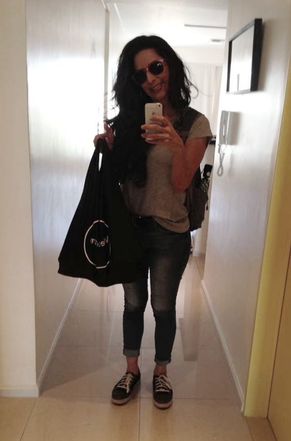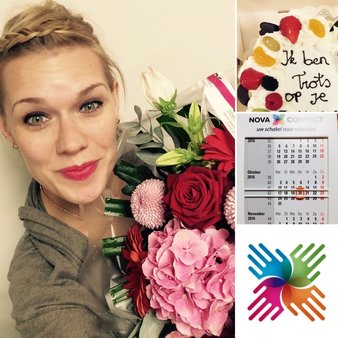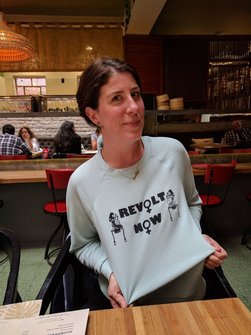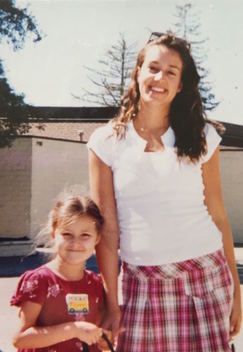 Melissa took this picture on her first day of our We Roam Program. She packed herself a lunch and said it felt like the first day of school. Melissa took this picture on her first day of our We Roam Program. She packed herself a lunch and said it felt like the first day of school. Melissa Smith runs her own business, The PVA (Personal Virtual Assistant), which connects clients to virtual assistants to help them use their time more efficiently in order to take their businesses to the next level. Melissa’s story really intrigued me because she didn’t follow the traditional route, opting for a vocational school instead of a 4-year college. What started out as a conversation between friends quickly became a master class in starting and running your own successful business. I was so inspired after talking to Melissa, and I know you’ll feel the same after reading this interview. Our conversation has been edited for length and clarity. When you were 17, what did you want to be? So when I was 17, I had a bit of a different situation than most teens. A month before I turned 17, I became a mom. So that’s not the norm. But I actually knew I wanted to be a secretary (back then the term administrative assistant had just started floating around). Although I was firmly planted in this, no one was excited about it, everybody thought that was where you start and you work your way up from there. They didn’t think that being a secretary was noble, but I did. I really thought of it as you get to serve people; not everyone can be the CEO, not everyone can be a founder. I always saw it as a really pivotal role and I was not swayed by anyone’s opinion. In fact it probably made me more determined.
0 Comments
 Lydia celebrating the 1-year anniversary of Nova Connect. A client sent her that cake with the inscription, "Ik ben trots op je," which means "I'm proud of you" in Dutch. Lydia celebrating the 1-year anniversary of Nova Connect. A client sent her that cake with the inscription, "Ik ben trots op je," which means "I'm proud of you" in Dutch. Lydia Gitsels is from Amsterdam, where she runs her own business as a government grant expert. Through her company, Nova Connect, Lydia researches and matches local, national, and European government grant programs with small and medium businesses seeking support. This is just a small segment of what became a three-hour conversation, the perfect reminder for me that this project is as much about connecting with each person as it is about gathering information. Our conversation has been edited for length and clarity, obvi. When you were 17, what did you want to be? When I was a teenager…wow, that’s a hard question because when I was a teenager I just didn’t know anything really. When I was younger, I wanted to be an F-16 pilot, but I think I wouldn’t have made the medical test. But it’s never too late; I can still do it. [laughs]. And then in high school I just didn’t know, but we were forced to make a decision and you were forced to think about it and you had to pick a study basically.  Sarah's collection of rad feminist sweatshirts is roughly 60% of the reason we became friends. Sarah's collection of rad feminist sweatshirts is roughly 60% of the reason we became friends. Sarah Haman is an account director for DCX, guiding her clients through the creative process to a cohesive branding and advertising campaign. But she didn’t get there by following a master plan. Like many people, she gradually adjusted her goals throughout college, through different jobs, different cities, and different opportunities. Sarah gamely agreed to be my guinea pig for this project, and couldn’t have been a better starting point for this adventure in trying to answer the question, how did we get where we are? Our conversation has been edited for length and clarity. When you were 17, what did you want to be? Probably the editor of Vogue. I don’t think I had a name for it - it was more of a feeling. I just wanted to be a fancy woman who people respected, and I didn’t know what that looked like. I mean, I’m sure it looked like a great outfit and people wanting to work with me.  My first day of senior year and my sister's first day of kindergarten. At ages 17 and 5, we had roughly the same level of insight about what we wanted to do professionally. My first day of senior year and my sister's first day of kindergarten. At ages 17 and 5, we had roughly the same level of insight about what we wanted to do professionally. I’ve been finding myself having the same conversation about prospective majors and careers with a lot of my students lately. I’m hearing a lot of anxiety about not knowing exactly what they want to do in the next four years, and ultimately, not knowing what they want to do with the rest of their lives. My response to this is often to share my own story. Regular readers (i.e., my friends and family) will be familiar with my (nonlinear) journey to this profession, but I’ll share the spiel I give my students. I tell them that when I was a senior in high school, I had vague ambitions of double-majoring in finance and French. This was mainly due to the fact that I had met a family friend who worked in finance and seemed to go on a lot of business trips to France. Based on my scant knowledge of her job and my extensive admiration for her chic New York City lifestyle, I decided that sounded good to me too. Spoiler alert: I never took a single finance or French class in college. What I did instead was follow my interests. My childhood love of Shakespeare and Greek and Roman mythology led me to major in classics and minor in English. My year abroad in Rome led to me study Italian, moving on from my four years of high school French. My core curriculum requirements offered the perfect combination of structure and flexibility, pushing me to explore subjects outside my wheelhouse like political philosophy, evolution and genetics, and American pluralism. The challenge with an abstract major like classics or English is that there is no direct line from that major to a profession, other than teaching those things. But the benefit is that you can do almost anything with those degrees, from medicine, to business, to technology, to professions I’ve never even heard of. The thing I always tell my students is that when I was 17, I didn’t know there was such a thing as an independent college counselor. But the academic and professional experiences I’ve had in the last 15 years have combined to lead me to a career I love, one that I find both challenging and satisfying, and one that I hope to do for decades to come. So that’s my story. But I’m not unique. In fact, I would argue that I’m the rule, not the exception. As much as students feel pressure to find their path - or at least a path - before they go to college, I think it’s much more common to discover your interests, your strengths, and your ambitions along the way. To that end, I’m kicking off a new project on the blog. One of the best parts of traveling the world this year has been getting to know the locals who share our co-working spaces, the leaders who are facilitating our adventure, and my fellow Roamers, hearing the stories of how they wound up here, circling the globe and working remotely. We hail from different states, different countries, and almost as many different industries as there are people. I’ll be sharing their stories here every week, starting with my roommate, Sarah, an account director and alumna of Virginia Commonwealth University. My hope is that through this, students and parents will start to see the value of simply being curious, even if you’re not completely certain. Originally posted on vivedconsulting.com
*** When I was a kid, one of the highlights of the week was going out for pizza after a softball game or a Girl Scout meeting. The parents would sit at the table and manage the chaos of 14 girls’ pizza topping preferences. And the kids would crowd into the tiny little arcade that boasted three or four video games. I was always most compelled by the racecar game, where you’d select your car (about which I knew nothing) and your location (Miami, Paris, Outer Space). What I remember most vividly about this game was the hypersensitive steering wheel. You’d nudge the wheel slightly to one side, and your car would go careening into the guardrail or off a cliff. It made me terrified of driving an actual car; I couldn’t believe my parents were skillful enough to keep the vehicle in a straight line on the road. Now I know that real cars aren’t like that, but that image has stuck with me, of trying to correct in one direction or another and instead of veering wildly off to the side. I use this metaphor a lot with my students when we’re in the college search process. Finding colleges that are the right fit is an art, not a science. A student can tell me that they love Loyola Marymount’s Southern California location, but that doesn’t mean they’ll be equally enamored with University of Redlands, Chapman University, and Occidental College. Or a student can identify January term as one of the things they’re looking for in a school, but that doesn’t mean that Colby College, Saint Mary’s College of CA, and Elon University are all a similarly good fit. And so searching for the right colleges can feel a little like that racecar game, where for every one appealing college, five schools aren't quite right. But there is no perfect list of schools, no ten colleges that are right in a sea of 2,500 that are wrong. In reality, colleges have more that unites them than divides them. So there aren’t just ten colleges where you can be happy; there are hundreds. The students I work with who have great college experiences do so because they’ve given thoughtful consideration to what they need from a school. They’ve come up with ideas of what they want to do when they get there: clubs to join, opportunities to apply for, and academic programs to explore. Students go in with openness and enthusiasm, ready to give as much to a school as they hope to get. A successful college experience (and after college too, for that matter), depends on what you do than where you go. And just like crashing into the walls in that racecar game helps you find stability, taking the time to sift through the colleges that aren’t right for you will help you recognize the ones that are. |
What is the When I Was 17 Project?When I Was 17 is a blog series dedicated to collecting the varied stories of people's career paths, what they envisioned themselves doing when they were teenagers and how that evolved over the course of their lives. I started this project with the goal of illustrating that it's okay not to know exactly what you want to do when you're 17; many successful people didn't, and these are a few of their stories.
Archives
October 2020
|